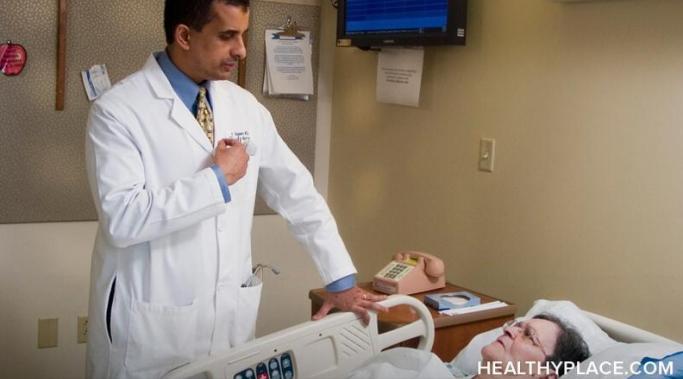Have you heard of the e-patient? If not, it’s OK, I hadn’t heard of them up until about a year ago either. And quite frankly, once I did hear the term, no one really explained it to me so I figured it was an “electronic” patient – maybe one who walked around with their health records on a USB stick, or maybe a cyborg patient (in which case, I qualify).
Well, it turns out that there aren’t a lot of cyborg patients and while an e-patient might walk around with their medical records, “e-patient” actually refers to patients who are equipped, enabled, empowered and engaged. And, depending on whom you ask, also educated, expressive, expert and electronic.
That’s a lot of stuff. And quite frankly, way too much pressure, so let’s boil it down – an e-patient is one who’s engaged with their own healthcare, and ideally, we all should be one.
Talking to Doctors
Mental illness symptoms are as cold and generic as inhumanly possible. “Depressed mood.” “Loss of energy or fatigue.” “Psychomotor retardation or agitation.”
Ah, yes, those things. They sound like a bummer.
Although, actually, they don’t. They sound like characteristics of a lab animal.
And one of the pesky symptoms of depression is “easy to tear.” You know, you cry a lot.
But everyone cries, so how bad could that possibly be?
Recently, someone who was new to the world of bipolar disorder asked me if there was a cure for bipolar disorder or if he had to live like this forever. I had to, of course, tell him there is no cure. I felt like I was telling him his dog was about to die. I felt like knowing this, he might give up.
I have said to people many times - your psychiatrist works for you. You pay the psychiatrist. They are your employee. That means you're the one who decides if they are hired or fired. But choosing a psychiatrist is no mean feat as someone who others consider "good" may not be "good" for you. So the only thing to do is to research and interview a doctor - just as you would any employee.
I've seen quite a few doctors and I've talked to quite a few people who've seen quite a few doctors and one thing that constantly comes up - and decreases patient care - is a negative relationship between patients and doctors / psychiatrists. There are many reasons people have a poor relationship with their doctor, but one of them is that people are intimidated by their doctor. And doctors never seem to understand, or compensate, for that. So, quite simply, we have to.
Doctors should take every patient seriously, but they don't. How can you get your doctor to take you seriously? Lets start with this recent comment (edited for length):
I have a masters degree in pharmaceutical science and have worked with clinical research for 11 years . . . I feel that maybe I get to close to be on the "same level" as my psychiatrist. . . I am afraid my doctor might think that I have better control of my bipolar "state" than I have. I do not have control . . . I want her to think of me as THE patient. But on the other hand I do want to be involved and discuss treatments etc. . . I think that she does not realize how bad I am right now. No one does. I am that happy, funny outgoing guy Johan. They just do not look behind the mask . . . It is strange that no one takes it seriously when you say you have suicidal thoughts. Mutilation . . . My doctor knows that I am depressed. But why does she not realize how bad it is?
So, how do you get your doctor to take your seriously when you often appear alright to your doctor? Can your intellect actually do you a disservice?
I have trust issues, but then, I think everyone does. We all grow up with people disappointing us and breaking our trust. It's just a part of becoming an adult.
But unfortunately, all relationships are based on trust, and this includes one with a doctor. It's essential to be able to trust what your doctor says and does. You have to be able to believe in what he's saying in order to try treatments that are often unpleasant and might make you feel worse before they make you feel better.
But doctors do a lot of things to break that trust, sometimes because they have to and sometimes simply because they do. So how's a patient to get over broken trust in a relationship with a doctor?
I love my readers for so many reasons, but one of them is that they leave intelligent and interesting comments on my posts. This one caught my eye:
. . . in my experience anytime you challenge a p-doc they try to attribute it to a symptom such as paranoia or delusions of grandeur. So my question is how to talk back to a doctor when you don't agree with him if you are as knowledgeable as you obviously are without that happening or is it a lost cause?
(Ever think a doctor has delusions of grandeur? Just saying...)
I do not think it's a lost cause. I talk to my doctor like a colleague all the time, but it is tricky.
By now we know the symptoms of bipolar disorder - wild mood swings from euphoria (mania or hypomania) to depression. We know that bipolar disorder comes in lots of variants, bipolar 1, bipolar 2, cyclothmia, rapid-cycling and so forth.
But when are the symptoms of bipolar disorder not bipolar disorder? Are there other illnesses that can account for bipolar symptoms?
When is bipolar disorder not bipolar disorder?
It's not my fault. We say it. We think it. We spread it around. It's supposed to assuage our guilt and make others believe we didn't do anything wrong, when maybe we did.
But occasionally, someone has a backbone. Not a politician, not a famous person, not a person in a position of power, but your average person that you interact with, they are capable of admitting they did something less-than-perfectly.
But never, ever is it a doctor's fault. It doesn't matter what they do, or what they say, it's never their fault. They never make a mistake. They never have a bad day. They never make an error in judgement. They never write the wrong name of a drug down on a script. Never, is it ever, their fault.




